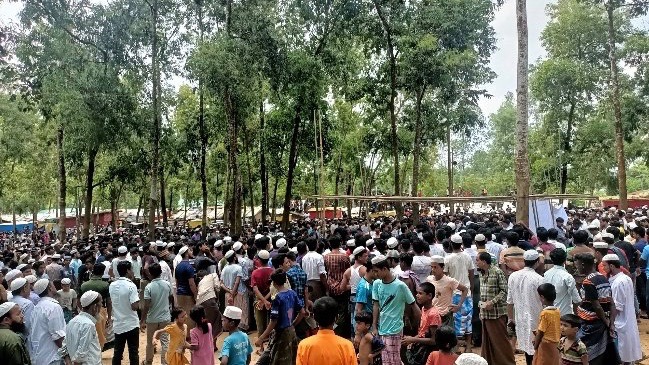On August 25, Rohingya refugees in Bangladesh’s Cox Bazar marked the fifth Genocide Day in remembrance of their mass exodus from Myanmar after a brutal military crackdown in the Rakhine State. Close to 750,000 Rohingyas fled due to the ethnic cleansing campaign, the majority of whom are now living in camps in Bangladesh.
The refugees gathered in the thousands in the camps in Cox Bazar and chanted slogans against the Myanmar military (Tatmadaw). They demanded that authorities take measures for their safe repatriation and accountability for the crimes committed against them. They also demanded citizenship rights and a dignified return to their homes in Myanmar.
“We don’t want to be trapped inside these camps in Bangladesh forever. It is painful. We want to go back to our homes,” a community leader said at a protest in the Kutupalong camp in Bangladesh.
Rohingya refugee in Bangladesh demonstrating today marks five years of memorial day for justices and demanding for a safe, dignified and voluntary return to the place of origin. pic.twitter.com/bz7TKEymp3
— Aung Kyaw Moe (@akmoe2) August 25, 2022
Persecution of Rohingyas
Widespread atrocities and gross human rights violations have been committed by the Myanmar army against the minority Muslim Rohingya community, targeting even women and children. The crimes committed against the Rohingyas have been termed by the the UN and several other rights bodies as a textbook example of ethnic cleansing and genocide.
Even today, as noted by the UN, the ground situation of the Rohingyas left behind in Rakhine is grim. “Rohingya communities have frequently been caught between the Tatmadaw and Arakan Army fighters or have been targeted directly in operations. 14 million are in need of humanitarian assistance,” UN High Commissioner for Human Rights Michelle Bachelet said in a press conference on August 25.
The United Nations Fact-Finding Mission on Myanmar in 2018 called for the investigation and prosecution of General Min Aung Hlaing and other top military officials for war crimes, crimes against humanity, and genocide in Rakhine, Kachin, and Shan States.
Scores of refugees in Ukhia in Cox Bazar marked the ‘Genocide Day’ and reiterated their message to the international community to fulfill its responsibility in holding the perpetrators of this ethnic cleansing accountable.
“Today we are holding a demonstration, because in 2017 the Burmese army killed our people in a genocide. They killed my husband and others. The military raped us, then they killed our children, throwing them into fires and snatching them from the laps of mothers,” said Jamalida Begum, a Rohingya refugee who fled the bloodshed in Rakhine and came to Bangladesh.
2021 military coup
After the military took over the civilian government in Myanmar in a coup in February 2021, General Hlaing assumed the role of Chairman of the State Administration Council. Persecution of around 600,000 Rohingyas who remained in Myanmar has continued under military rule.
Human Rights Watch estimated that since February 2021, the junta forces have arrested at least 2,000 Rohingyas, including hundreds of minors, for unauthorized traveling. At least 53 Rohingyas from Maungdaw were arrested in the Thandwe Township last month for attempting to flee the country.
According to a report by the Independent Investigative Mechanism for Myanmar (IIMM), there has been little or no “progress on ending impunity and ensuring accountability for crimes committed” against the Rohingya community.
Over these five years, Rohingya refugees have taken asylum in countries like Bangladesh, Malaysia, Pakistan, Saudi Arabia, India, and the United States.
They are unable to return to their homes in Myanmar where they face systematic abuse which, as per several rights bodies including the Human Rights Watch, amounts to crimes against humanity and apartheid. The life of Rohingyas who took asylum in Bangladesh and elsewhere is also not easy. They are increasingly viewed with suspicion and as a burden. The international community has almost completely ignored their worsening plight.
The refugees complain that many people in Bangladesh feel that they have now outstayed their welcome. They also accuse the Bangladeshi government of structurally denying them access to education, healthcare, drinking water, and freedom of movement, making their lives in the camps unbearable. The refugees feel desperate to leave even when they have nowhere to go.
#RohingyaGenocideRemembranceDay Rohingya are demanding justice, rights, freedoms and citizenship with safe repatriation to their motherland #Arakan state, #Myanmar. The International community should come forward to support #Rohingya refugees for repatriation and justice issues pic.twitter.com/v07UKWqjrH
— Md Jamal Photography (@mdjamal315) August 25, 2022
Fear of facing oppression
According to Abdur Rahim, leader of the Arakan Rohingya Society for Peace and Human Rights, the major concern among the refugees has shifted from everyday survival to fear of the future. The activist said that the Sheikh Hasina-led government in Bangladesh has tried but failed to repatriate the refugees, most of whom are willing to return but fear further oppression in Myanmar.
“The persecution against the Rohingya continues daily, the Rohingya in Arakan or Rakhine State are fleeing daily. The people are not allowed to travel freely like others; they attempt to leave the country through smugglers,” Ro Nay San Lwin, an activist from the Free Rohingya Coalition, told Peoples Dispatch.
5 years ago some 700,000 stateless #Rohingya fled Myanmar to Bangladesh in search of safety +protection. At the peak of the crisis, thousands were making the crossing daily, walking for days through jungles and mountains, or braving dangerous sea voyages across the Bay of Bengal. pic.twitter.com/eRpQMbe5yW
— Shabia Mantoo (@Shabia_M) August 25, 2022
While the international community has been focusing on the Ukraine crisis, the less privileged Rohingyas continue to suffer in silence with no respite in sight. Two repatriation attempts have failed to yield any results due to reluctance of concerned authorities to offer the refugees any guarantee of safety or citizenship rights in their country of origin.





